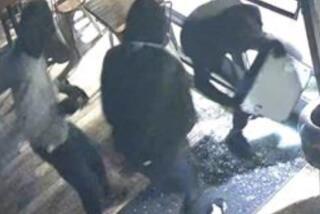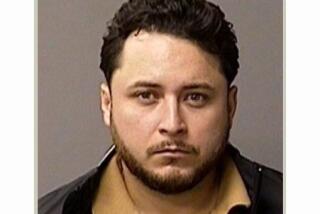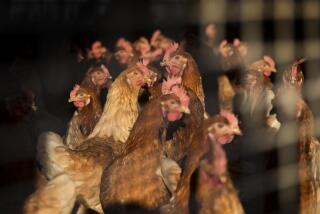Raw-food crackdown went too far, defense attorneys say
The bust had all the makings of a major criminal investigation.
Ten law enforcement and regulatory agencies dedicated hundreds of hours of personnel to track the suspects. They used high-tech video equipment hidden on a utility pole for round-the-clock surveillance and undercover agents to make covert buys.
This wasn’t a major narcotics trafficking investigation or an attempt to take out a violent street gang — it was a crackdown on what authorities allege was illegal trafficking of raw goat milk, cheese and yogurt.
The arrests this summer of a Ventura County farmer, her assistant and the operator of a Venice health food store called Rawesome have become a rallying cry for raw-food advocates, who have grown frustrated by what they describe as the government’s hard line on nontraditional food sources.
In the months since the arrests, new details have emerged about the lengths that authorities went to build their case, attorneys for the three suspects said.
Defense attorneys said they’ve learned through the prosecution that the investigation included hours of secretly recorded video, “decoy” buys at Rawesome and at farmers’ markets in Pasadena, Santa Barbara and Santa Monica. The one-year investigation included hundreds of hours of work and is documented in thousands of pages of reports, they said.
The suspects — known in the raw-food community as the “Rawesome Three” — are free on bail and scheduled to return to court Dec. 1.
“If this were a terror plot against LAX, or against the mayor, I could understand it,” said L. Arik Greenberg, an author and lecturer who used to shop regularly at Rawesome. “But these are people who want to get milk from a farm and drink it.”
Defense attorneys and customers such as Greenberg described Rawesome as a private food club, not a public store, where they could buy raw dairy products as well as organic produce, meat and honey. Members paid dues that enabled them to own the animals that produced the raw dairy products. They say the store gave them a healthy alternative to mass-produced, processed foods that fill supermarkets and fast-food outlets.
Prosecutors say raw milk poses significant risks of contamination that can cause illness or death. They say the three suspects violated the law by operating without required licenses, which meant regulatory agencies weren’t able to inspect them for safety and cleanliness.
They said that pasteurization — the heating of milk at high temperatures — kills or slows the growth of potentially harmful pathogens. Unpasteurized, or raw, milk poses a risk of contamination, including salmonella, listeria, E. coli, staphylococcus aureus and tuberculosis. That’s why the law requires raw dairy processing plants to be licensed, animals to be inspected by veterinarians, and facilities and equipment to meet sanitation requirements, prosecutors said.
On Aug. 3, prosecutors leveled a combined 13 charges against Rawesome owner James Cecil Stewart, 64; Sharon Ann Palmer, 51, owner of Healthy Family Farms in Santa Paula; and her employee, Eugenie Victoria Bloch, 58. Six of the charges are felonies. The charges included operating an unlicensed milk plant, conspiracy to sell unlawfully produced milk products and producing milk products in unsanitary conditions. Stewart is accused of tearing down a health department closure notice in 2010 and reopening the store.
The three suspects have pleaded not guilty to all charges.
Los Angeles County Deputy Dist. Atty. Kelly Sakir declined to discuss the investigative techniques used in the case. Sandi Gibbons, a spokeswoman for the district attorney’s office, said of the defense criticism: “If they make similar allegations in court, we’ll be more than happy to answer them in court, which we think is a proper forum.”
Prosecutors credited 10 local, state, and federal law enforcement and regulatory agencies for their help in the investigation, including the Food and Drug Administration, California Department of Food and Agriculture, the departments of public health in Los Angeles and Ventura counties, the Los Angeles Police Department and others.
Legal experts said they were not surprised by the extent of the investigation, especially because it involved agencies not ordinarily involved in high-profile cases.
“It may sound like overkill. But from the agencies’ perspective, they want to show they can do their version of a major case,” said Loyola Law School professor Laurie Levenson, a former federal prosecutor. “They don’t want to lose it. That’s why they went to the extreme measures of putting in surveillance cameras and doing undercover buys. From the use of resources, what they can say is they’re saving human lives, so it’s worth it.”
Ed Flores, a criminal defense attorney and former Orange County deputy district attorney, said authorities may have felt compelled to act because the businesses continued to operate despite warnings from health officials. And the best way to make a case is through undercover buys, he said.
“They have to show they’re selling a product they’re not supposed to be selling. The only way they can do that is to make a buy,” Flores said.
But attorneys for the defendants believe the investigation and raid on Rawesome was overkill. They said regulators could have made their point with citations and fines. Using undercover agents and hidden surveillance cameras to put farmers and health-food advocates behind bars was a reach, they said.
“It’s a tremendous misuse of resources and a waste of time,” said Matthew Bromund, the attorney representing Palmer and her farm. “The kind of investigation that was done in this case is similar to what you see in a violent criminal enterprise, something the mob would be involved in.”
Debate about regulating raw milk in California has spanned decades. Alta Dena Dairy co-founder Harold J.J. Stueve fought for decades to help keep raw milk sales legal in California, only to give up after a series of legislative and legal setbacks.
In 2010, Whole Foods pulled raw cow milk from its stores in California and three other states, citing high insurance costs “because of the potential risks from selling unpasteurized milk and milk products.” It had been one of the few chain stores to sell raw milk products in the state.
The arrests and closure of Rawesome have led members to scramble for alternative sources of raw milk, sources that many members decline to disclose. They wonder why tax money is being used to police the production of health food.
“It’s very misplaced,” said Aajonus Vonderplanitz, a Malibu nutritionist and creator of the “Primal Diet,” which advocates raw meat, produce and dairy. “We’re throwing money to people on Wall Street and not taking care of those criminals and at the same time spending all this money to go after raw milk.”







